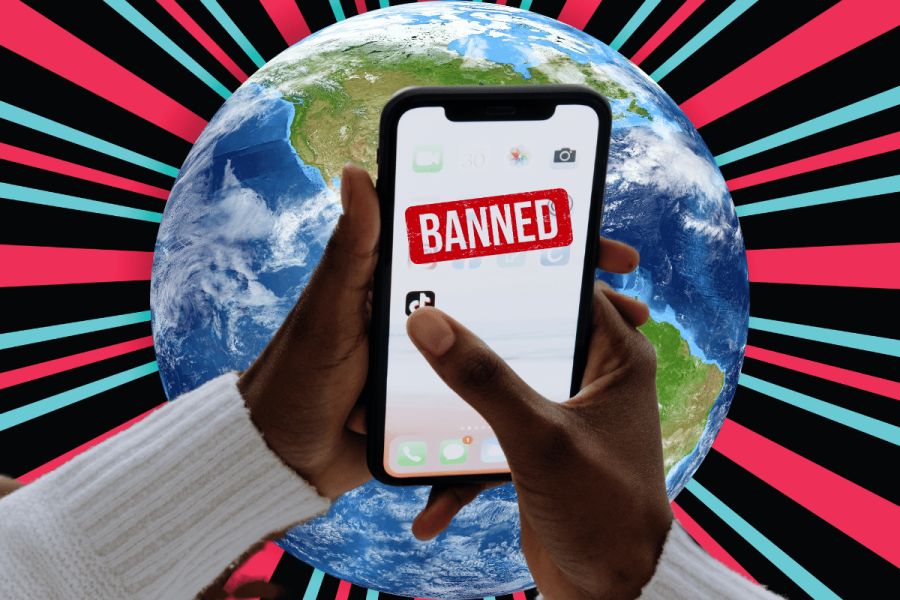TikTok has encountered a barrage of bans, and the U.S. is close to joining the list. Discussions of a ban started last year, gaining attention, especially after a high-profile congressional hearing featuring TikTok’s CEO, Shou Zi Chew. By 2024, the House of Representatives, with a significant majority, approved legislation requiring parent company ByteDance to sell its interest in the app or risk being banned in the United States.
There has already been a swathe of countries that have imposed varying degrees of limitations on the app, primarily due to privacy and cybersecurity issues linked to its parent company ByteDance and its connections to the Chinese government. The European Commission and NATO alongside federal governments worldwide, have prohibited their staff from installing TikTok on work-issued phones.
Here are the countries that have imposed partial and full bans on the app:
Afghanistan
Afghanistan banned the app in 2022 as part of a moral policing drive by the ruling Taliban, a spokesman for the group said.
Bloomberg reports that Inamullah Samangani criticized the popular social media app on Twitter for “misleading the younger generation.” He further elaborated over the phone that TikTok’s “filthy content” did not align with Islamic laws.
Australia
On April 4, 2023, Australia became the latest country to ban TikTok from federal government devices, as concerns grow over the privacy and security of the Chinese-owned video-sharing app. The country is part of the so-called “Five Eyes” intelligence-sharing partners, who have all taken similar steps against the social media firm.
A statement from the Attorney General’s Department highlighted that TikTok presents security and privacy concerns because of the”extensive collection of user data and exposure to extrajudicial directions from a foreign government that conflicts with Australian law.”
Attorney-General Mark Dreyfus said on the official website: “The direction will come into effect as soon as practicable.”
Belgium
Belgium banned the use of TikTok on federal government service devices in March 2023 as its security apparatus warned it collected “a large amount of data from its users, often without them realizing it,” while “manipulating the flow of information.”
Belgian Prime Minister Alexander De Croo said in a statement shared with POLITICO: “We can’t be naive: TikTok is a Chinese company that currently is mandated to cooperate with Chinese intelligence services.”
Canada
Canada, who is also part of the “Five Eyes” intelligence alliance, also prohibited the use of the app on government devices in February 2023.
In a statement, the Canadian Treasury Board Secretariat President Mona Fortier said: “The decision to remove and block TikTok from government mobile devices is being taken as a precaution, particularly given concerns about the legal regime that governs the information collected from mobile devices, and is in line with the approach of our international partners.”
Denmark
In line with other European countries, Denmark’s Defense Ministry banned its employees from having video-sharing app on their work phones as a cybersecurity measure in March 2023.
The ministry said it would “ban the use of the app on official units,” saying “there were weighty security considerations within the defense ministry combined with a very limited work-related need to use the app.” Its Center for Cybersecurity added: “Several of the data sources that TikTok can collect have the potential to be used for espionage against the app’s users.”
Even its public-service broadcaster, DR, advised staff not to have TikTok on their work phones.
Estonia
In late March, Estonia’s departing IT and foreign trade minister, Kristjan Järvan, announced to a local newspaper that TikTok would be prohibited on state-issued smartphones for public officials.
However, in a conversation with Eesti Päevaleht, the minister further stated: “If a public official uses their private phone while at work, we really won’t be looking into that.”
The European Union
The European Commission suspended the use of TikTok on its corporate devices and on personal devices enrolled in the Commission mobile device service in February 2023. It explained: “This measure aims to protect the Commission against cybersecurity threats and actions which may be exploited for cyber-attacks against the corporate environment of the Commission.”
The Parliament also banned TikTok from staff phones, following in the footsteps of the Commission and the EU Council.
France
France was the first country to intensify efforts to ban “recreational” applications, such as Netflix and TikTok, on government devices.
According to French Minister of Public Service Stanislas Guerini, these apps presented “risks in terms of cybersecurity and protection of the personal data of public servants and the administration.”
The banned apps reportedly included gaming applications such as Candy Crush, streaming applications like Netflix, and recreational applications like TikTok, adding that X itself is also on the list.
Pour garantir la cybersécurité de nos administrations et de nos agents publics, le @gouvernementFR a décidé d’interdire les applications récréatives comme TikTok, sur les téléphones professionnels des fonctionnaires d’État. @jnbarrot pic.twitter.com/avxtpKZ6uu
— Stanislas Guerini (@StanGuerini) March 24, 2023
India
In 2020, India took decisive action against TikTok, enacting a national prohibition on TikTok along with 58 other Chinese apps, citing their involvement in activities “prejudicial to the sovereignty and integrity of India, the defence of India, the security of the state and public order.”
This measure was implemented following a lethal confrontation at the border between Indian and Chinese military troops, in which 20 Indian soldiers were killed. India stands as the largest nation to implement a comprehensive ban on the app.
The companies were provided an opportunity to address inquiries regarding privacy and security standards, but the ban was made permanent in January 2021.
The Netherlands
In March 2023, the Dutch government advised officials against installing the Chinese-owned video app and using social media from other countries with “offensive” cyber programs.
Dutch Digital Minister Alexandra van Huffelen stated that the decision followed a recommendation from the country’s secret service (AIVD), which found that such apps posed “an inherent espionage risk.”
“The first step is to immediately discourage civil servants… from having apps installed and using them on their mobile work equipment from companies in countries with an offensive cyber programme against the Netherlands,” she said.
Nepal
In November 2023, Nepal imposed a ban on TikTok, claiming it was a disruption of “social harmony.” The BBC reports that the prohibition was enforced immediately, as stated by the Minister for Communications and Information Technology, Rekha Sharma, who highlighted the app’s distribution of harmful content.
TikTok enjoys widespread popularity in Nepal, particularly among younger audiences and female social media enthusiasts.
New Zealand
In the wake of similar actions taken by various European countries, New Zealand’s parliament banned TikTok across all staff devices.
In a statement, the government said: “On advice from our cyber security experts, Parliamentary Service has informed members and staff the application TikTok will be removed from all devices with access to the parliamentary network.
“Based on this information the Service has determined that the risks are not acceptable in the current New Zealand Parliamentary environment.”
Norway
In March, the Norwegian Parliament prohibited TikTok on government devices but allowed civil servants to use the app for professional reasons on their personal devices. The country’s Justice Minister, Emilie Enger Mehl, stated in an announcement, “The Norwegian intelligence services single out Russia and China as the main risk factors for Norway’s security interests.”
However, the 30-year-old had to then apologize for failing to admit when quizzed in Parliament, that she had installed and used TikTok on her government-issued phone.
Pakistan
Despite being aligned on certain issues, Pakistani authorities temporarily banned TikTok at least four times since October 2020, citing concerns over the promotion of “obscene content.” However, the bans have since been lifted.
Somalia
Somalia’s government banned TikTok, messaging app Telegram and online-betting website 1XBet in August 2023 to limit the spread of what they believe is indecent content and propaganda.
“The minister of communications orders internet companies to stop the aforementioned applications, which terrorists and immoral groups use to spread constant horrific images and misinformation to the public,” Communications Minister Jama Hassan Khalif said in a statement.
Taiwan
In December 2022, Taiwan introduced a ban on TikTok within the public sector, following an FBI warning about the national security risks posed by the app.
Devices owned by the government, such as mobile phones, tablets, and desktop computers, are prohibited from using Chinese-made software. This includes applications like TikTok, its Chinese counterpart Douyin, and Xiaohongshu, a lifestyle content app from China.
The United Kingdom
In March 2023, Oliver Dowden, the UK Secretary of State for the Cabinet Office, declared an immediate ban of TikTok on devices used by government officials in a statement to the UK’s House of Commons.
Describing the decision as precautionary, Dowden noted, “We know that there is already limited use of TikTok across government, but it is also good cyber hygiene,” during his speech to the Members of Parliament.
The decision rests on findings from the UK’s National Cyber Security Centre, indicating potential risks associated with how sensitive government data might be accessed and used by certain platforms.
Despite the UK being among the first to prohibit the use of other Chinese-owned technologies like Huawei, critics have pointed out the country’s delay in taking similar action against TikTok, compared to its allies.
The United States
In March, the House of Representatives decisively approved a bill that allows TikTok’s parent company to sell its stakes in the app or confront a nationwide ban.
However, the bill awaits Senate approval, where there has been previous resistance to a ban due to concerns about freedom of speech.
Should the bill pass both legislative bodies, President Joe Biden has pledged to enact it into law.
Already, more than half of the U.S. states have prohibited TikTok on government devices citing data security worries, and the government has directed agencies to remove the app from federal devices and systems by the end of March.
Warnings from both the FBI and the Federal Communications Commission have highlighted risks of ByteDance potentially sharing TikTok user data with the Chinese government.
There’s also anxiety about the impact of TikTok’s content on the mental health of teenagers. A December report by the Center for Countering Digital Hate revealed that content related to eating disorders on the platform had garnered 13.2 billion views.
TikTok is used by roughly two-thirds of American teens, as per Pew Research Center findings, and the app has 170 million users in the United States.
Featured image: Canva

















